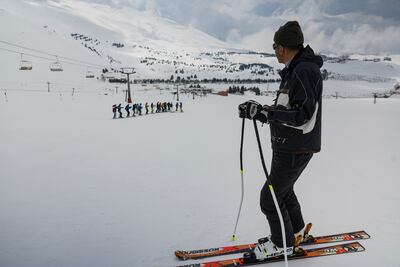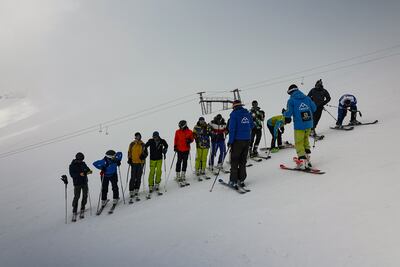The warmth of Col Samih Khalil’s greeting contrasts with the bitter cold outside. On the top floor of the Youssef Rahme Barracks above the mountaintop town of Bcharre, he offers coffee and tea, accompanied by manoucheh flatbreads.
Lebanon is experiencing one of its coldest winters in decades. Throughout the season, drifts of snow have progressively accumulated around the base.
During the summer the nearby Cedars of God, one of Lebanon’s oldest cedar forests, attracts plenty of tourists. In the colder months, the town attracts winter sports enthusiasts.
The National visits Bcharre on a weekday and the town is quiet, save for a few enthusiastic shopkeepers selling tourist merchandise. And, of course, the 150 or so Lebanese soldiers who staff the base.
When coffee grounds are all that remain at the bottom of cups, Col Khalil shows portraits of the former base commanders – his predecessors – mounted on the wall above an imposing fireplace. The photographs at the top have started to fade with age.
"The base in the past had a great history, even internationally," he says. It has been a key element of the army’s training strategy since the foundation of the state of Lebanon "because we have lots of mountains in Lebanon and we have many units stationed in the mountains".
Recruits learn how to move across the snow with little support and how to treat the injured in inhospitable conditions.
The army’s training up here is not just military in nature, Col Khalil says, because the army is often called to help stranded civilians in the rugged, isolated mountain terrain. "We offer them help, we evacuate the injured, we evacuate the sick," he says.
This should have been the perfect posting for Col Khalil, who grew up in the mountains and adores skiing. But he arrived at the base in 2019, shortly before Lebanon’s devastating financial crisis. A few months later, he was dealing with the effects of the Covid pandemic.
"I didn’t have time to enjoy, because the last two years, in 2020 and 2021, we couldn’t do any events. We couldn’t even organise the military championship," he says. "The last two years, we did almost nothing."
The base is slowly working towards resuming some of its activities. Col Khalil is preparing to inspect a downhill ski training session for some of the recruits and so goes to change out of his military fatigues.
In his ski gear, without the trappings of his military rank, he could be any middle-aged enthusiast. It is what he would have wanted to become in a few years, had his retirement plans not been completely upended by the financial crisis.
A line of polished red snowmobiles demonstrate one of the base’s lifelines. Foreign army units have been coming here to train since the barracks was opened, but the base has become increasingly reliant on aid from its international partners. These snowmobiles were donated by Canada, but it is not a sustainable model and the budget for updating the rest of the inventory has vanished.
"It is affecting our performance here because all the equipment we use in training is imported," Col Khalil says. "Now, with the budget that we have, we can barely buy one pair of skis a year."
At the end of a short drive between two-metre banks of snow on either side are a handful of tired looking ski lifts. This is the oldest ski resort in the country – and looks it too, especially when compared with larger resorts closer to Beirut that still attract Lebanon’s fashionable elites on the weekend.
Here, the rental equipment on offer is ancient by comparison and the advertising campaigns on the lifts and shop fronts were envisioned for different generations of gear and skiers.
Col Khalil clips into his skis and expertly takes the drag lift offered to him by one of the lift attendants. From the top, gaps in the clouds reveal some of Lebanon’s most spectacular mountain scenery. The resort below nestles in a vast natural mountain amphitheatre, adjoining the rugged Qadisha Valley that winds down towards Tripoli.
He gestures towards the other side of the piste. "You can see there, this old chairlift. It’s not working any more." The lift belongs to the army and has been taking trainees up the slopes since the 1950s, but no longer.
"Now, we cannot find spare parts any more," he says. The army is looking to replace the lift, but that depends on finding someone willing to donate it.
The base is snowed under, struggling to carry on amid the global pandemic and the crippling financial crisis, with its staff's salaries dwindling to almost nothing and ever more reliant on international aid for equipment. Nonetheless, Khalil says, the base 'will get through the crisis because the crisis won't stay forever.'
In the meantime, the army makes do. The recruits wear a hodgepodge of different clothing. A seasoned French instructor guides them down the slopes, one turn at a time.
Col Khalil stays with them, watching, not interfering. But as the group gets closer to the bottom of the piste, the colonel skis off and grabs another drag lift. Time for one more run before returning to base.
How the bonus system works
The two riders are among several riders in the UAE to receive the top payment of £10,000 under the Thank You Fund of £16 million (Dh80m), which was announced in conjunction with Deliveroo's £8 billion (Dh40bn) stock market listing earlier this year.
The £10,000 (Dh50,000) payment is made to those riders who have completed the highest number of orders in each market.
There are also riders who will receive payments of £1,000 (Dh5,000) and £500 (Dh2,500).
All riders who have worked with Deliveroo for at least one year and completed 2,000 orders will receive £200 (Dh1,000), the company said when it announced the scheme.
Nancy 9 (Hassa Beek)
Nancy Ajram
(In2Musica)
SHOW COURTS ORDER OF PLAY
Wimbledon order of play on Saturday, July 8
All times UAE ( 4 GMT)
Centre Court (4pm)
Agnieszka Radwanska (9) v Timea Bacsinszky (19)
Ernests Gulbis v Novak Djokovic (2)
Mischa Zverev (27) v Roger Federer (3)
Court 1 (4pm)
Milos Raonic (6) v Albert Ramos-Vinolas (25)
Anett Kontaveit v Caroline Wozniacki (5)
Dominic Thiem (8) v Jared Donaldson
Court 2 (2.30pm)
Sorana Cirstea v Garbine Muguruza (14)
To finish: Sam Querrey (24) leads Jo-Wilfried Tsonga (12) 6-2, 3-6, 7-6, 1-6, 6-5
Angelique Kerber (1) v Shelby Rogers
Sebastian Ofner v Alexander Zverev (10)
Court 3 (2.30pm)
Grigor Dimitrov (13) v Dudi Sela
Alison Riske v Coco Vandeweghe (24)
David Ferrer v Tomas Berdych (11)
Court 12 (2.30pm)
Polona Hercog v Svetlana Kuznetsova (7)
Gael Monfils (15) v Adrian Mannarino
Court 18 (2.30pm)
Magdalena Rybarikova v Lesia Tsurenko
Petra Martic v Zarina Diyas
MOUNTAINHEAD REVIEW
Starring: Ramy Youssef, Steve Carell, Jason Schwartzman
Director: Jesse Armstrong
Rating: 3.5/5
Quick%20facts
%3Cul%3E%0A%3Cli%3EStorstockholms%20Lokaltrafik%20(SL)%20offers%20free%20guided%20tours%20of%20art%20in%20the%20metro%20and%20at%20the%20stations%3C%2Fli%3E%0A%3Cli%3EThe%20tours%20are%20free%20of%20charge%3B%20all%20you%20need%20is%20a%20valid%20SL%20ticket%2C%20for%20which%20a%20single%20journey%20(valid%20for%2075%20minutes)%20costs%2039%20Swedish%20krone%20(%243.75)%3C%2Fli%3E%0A%3Cli%3ETravel%20cards%20for%20unlimited%20journeys%20are%20priced%20at%20165%20Swedish%20krone%20for%2024%20hours%3C%2Fli%3E%0A%3Cli%3EAvoid%20rush%20hour%20%E2%80%93%20between%209.30%20am%20and%204.30%20pm%20%E2%80%93%20to%20explore%20the%20artwork%20at%20leisure%3C%2Fli%3E%0A%3C%2Ful%3E%0A
Six large-scale objects on show
- Concrete wall and windows from the now demolished Robin Hood Gardens housing estate in Poplar
- The 17th Century Agra Colonnade, from the bathhouse of the fort of Agra in India
- A stagecloth for The Ballet Russes that is 10m high – the largest Picasso in the world
- Frank Lloyd Wright’s 1930s Kaufmann Office
- A full-scale Frankfurt Kitchen designed by Margarete Schütte-Lihotzky, which transformed kitchen design in the 20th century
- Torrijos Palace dome
Company profile
Company: Verity
Date started: May 2021
Founders: Kamal Al-Samarrai, Dina Shoman and Omar Al Sharif
Based: Dubai
Sector: FinTech
Size: four team members
Stage: Intially bootstrapped but recently closed its first pre-seed round of $800,000
Investors: Wamda, VentureSouq, Beyond Capital and regional angel investors
England's lowest Test innings
- 45 v Australia in Sydney, January 28, 1887
- 46 v West Indies in Port of Spain, March 25, 1994
- 51 v West Indies in Kingston, February 4, 2009
- 52 v Australia at The Oval, August 14, 1948
- 53 v Australia at Lord's, July 16, 1888
- 58 v New Zealand in Auckland, March 22, 2018
RACECARD
4.30pm Jebel Jais – Maiden (PA) Dh60,000 (Turf) 1,000m
5pm: Jabel Faya – Maiden (PA) Dh60,000 (T) 1,000m
5.30pm: Al Wathba Stallions Cup – Handicap (PA) Dh70,000 (T) 2,200m
6pm: The President’s Cup Prep – Conditions (PA) Dh100,000 (T) 2,200m
6.30pm: Abu Dhabi Equestrian Club – Prestige (PA) Dh125,000 (T) 1,600m
7pm: Al Ruwais – Group 3 (PA) Dh300,000 (T) 1,200m
7.30pm: Jebel Hafeet – Maiden (TB) Dh80,000 (T) 1,400m
UAE currency: the story behind the money in your pockets
German plea
Ukrainian President Volodymyr Zelenskyy told the German parliament that. Russia had erected a new wall across Europe.
"It's not a Berlin Wall -- it is a Wall in central Europe between freedom and bondage and this Wall is growing bigger with every bomb" dropped on Ukraine, Zelenskyy told MPs.
Mr Zelenskyy was applauded by MPs in the Bundestag as he addressed Chancellor Olaf Scholz directly.
"Dear Mr Scholz, tear down this Wall," he said, evoking US President Ronald Reagan's 1987 appeal to Soviet leader Mikhail Gorbachev at Berlin's Brandenburg Gate.
MATCH INFO
Asian Champions League, last 16, first leg:
Al Jazira 3 Persepolis 2
Second leg:
Monday, Azizi Stadium, Tehran. Kick off 7pm
BIGGEST CYBER SECURITY INCIDENTS IN RECENT TIMES
SolarWinds supply chain attack: Came to light in December 2020 but had taken root for several months, compromising major tech companies, governments and its entities
Microsoft Exchange server exploitation: March 2021; attackers used a vulnerability to steal emails
Kaseya attack: July 2021; ransomware hit perpetrated REvil, resulting in severe downtime for more than 1,000 companies
Log4j breach: December 2021; attackers exploited the Java-written code to inflitrate businesses and governments






